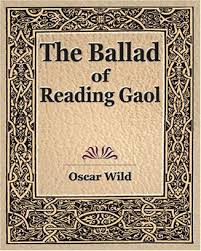Wilde was sentenced to two years hard labour for homosexual offences in 1895. Oscar Wilde wrote the poem The Ballad of Reading Gaol after being released from Reading Gaol. Wilde witnessed an inmate, Charles Thomas Wooldrige convicted of cutting his wife’s throat, who was hanged and the poem is an account of this. Through the poem, Wilde reveals the hardships and harsh conditions that all the inmates go through; but does not share his views on the penal system. The strict adherence to structure mirrors Wilde’s experience in prison.
The different relationship dynamics between the narrator, condemned man, readers and other inmates is revealed through this extract:
1] He did not wear his scarlet coat,
2] For blood and wine are red,
3] And blood and wine were on his hands
4] When they found him with the dead,
5] The poor dead woman whom he loved,
6] And murdered in her bed.
7] He walked amongst the Trial Men
8] In a suit of shabby gray;
9] A cricket cap was on his head,
10] And his step seemed light and gay;
11] But I never saw a man who looked
12] So wistfully at the day.
13] I never saw a man who looked
14] With such a wistful eye
15] Upon that little tent of blue
16] Which prisoners call the sky,
17] And at every drifting cloud that went
18] With sails of silver by.
19] I walked, with other souls in pain,
20] Within another ring,
21] And was wondering if the man had done
22] A great or little thing,
23] When a voice behind me whispered low,
24] ‘That fellow’s got to swing’.
25] Dear Christ! the very prison walls
26] Suddenly seemed to reel,
27] And the sky above my head became
28] Like a casque of scorching steel;
29] And, though I was a soul in pain,
30] My pain I could not feel.
31] I only knew what hunted thought
32] Quickened his step, and why
33] He looked upon the garish day
34] With such a wistful eye;
35] The man had killed the thing he loved
36] And so he had to die.
37] Yet each man kills the thing he loves
38] By each let this be heard,
39] Some do it with a bitter look,
40] Some with a flattering word,
41] The coward does it with a kiss,
42] The brave man with a sword!
Although the condemned man and Wilde never met, the execution affected Wilde greatly. It is clear that Wilde sympathises with Wooldrige as he too was separated from his wife and sons. Wilde states that ‘each man kills the thing he loves’ showing his understanding for Wooldrige’s situation. However, Wilde did not know that Wooldrige actually killed his wife on the street, she was not ‘murdered in her bed’. This shows that they never actually spoke and Wilde was affected by what was happening to Wooldrige rather than what he had done.
There is a state of mutual empathy between all the inmates as the condemned man walks to his death, Wilde says he ‘walked, with other souls in pain’. Everyone is feeling the same pain as they about to witness this happen. Finally, the narrator creates a melancholic picture for the readers to be consumed in. Therefore the readers feel the same amount of sympathy that Wilde has for Wooldrige.
Wilde, Oscar. (1907). The ballad of Reading gaol. Portland, Me.: T.B. Mosher.
